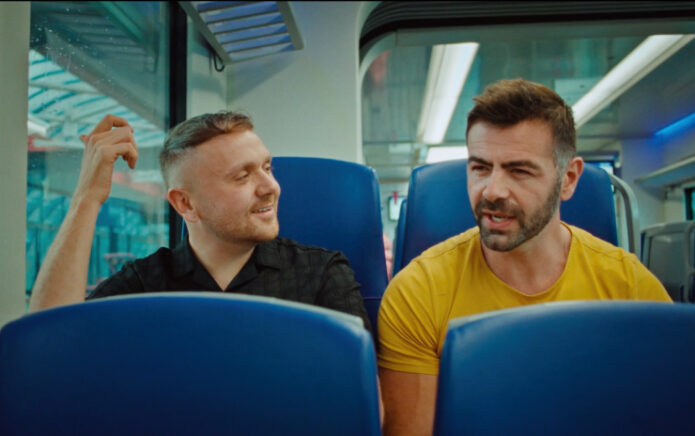
Queer Asia, a network and collective of queer-identifying scholars, academics, activists and creatives, has been spotlighting issues affecting LGBTQ+ people – or those belonging to other non-normative sexualities and gender identities – in Asia or Asian diasporas. Set up in 2016, Queer Asia began as a platform to encourage cultural dialogues, research and collaboration by Aapurv Jain, Allan C. Simpson, J. Daniel ‘Danny’ Luther and How Wee Ng, a group of academics and activists specialising in queer culture from different regions in Asia.
Initially making its mark as an academia-centred collective, Queer Asia has since expanded its scope and prioritised accessibility. From film festivals to art exhibitions, the collective’s bases in London and Berlin are showcasing vibrant communities of culture and proudly showcasing solidarity for queer Asian people. We sat down with Queer Asia members Misha Yakovlev and Ragil Huda to find out more about the platform and how they’re championing queer Asian stories.
Queer Asia is a pioneering platform bringing vital voices together. How did each of you get involved with the network?
Misha: I got involved for two reasons. One of the founders of the collective was a graduate teaching assistant in a class I took on queer Asian cinema as an undergraduate. They mentioned Queer Asia and I went to a few film festivals. Later on in my academic career, when I was starting my PhD, I kept in touch with the collective and I thought it was a good place to discuss issues of gender and sexuality in relation to Asia, especially because my own PhD research is transnational. Queer Asia was one of the only spaces where I could curate queer Asian short films and have a forum for discussion of issues relating to queerness in Central Asia, the Caucasus and Siberia.
Ragil: I got involved with Queer Asia in 2019 when I attended the summer programme. I co-founded a collective called QTIBIPOC Hamburg. I saw the work that Queer Asia had done in the past and it just felt right – this was during graduate school when I was new to European academia and wanted to be in touch with people working in similar fields, bridging academia and activism. One of the Queer Asia founders, Danny, let me bring Queer Asia to Berlin and gave me the leeway to organise whatever was needed. It was also supported by the NGO that I interned for called GLADT which offers psychological counselling for immigrants dealing with mental health issues and racism. Both were important elements in bringing Queer Asia to Berlin and paved the way for so many other things we’ve done.
Queer Asia is currently most active in London and Berlin. How do you ensure both locations work together?
Ragil: Each member has their own way of organising events and projects, but we always communicate. That’s what the beauty of Queer Asia is, the leeway and freedom to be able to curate and organise our own projects.
How do you measure the success of individual projects?
Misha: It’s important to question this metric or logic of success because we’re volunteers often doing things in our free time without funding. At the same time, Queer Asia has been extremely successful, for me, in fostering and solidifying personal and professional connections with amazing queer people and building solidarity networks. Queer Asia was conceived as a transnational Asian collective for queer people from Asia and the diaspora to work and think through things that connect and divide us. For me, it’s been very productive in that sense, and a lot of people find that it’s really great in terms of building community and conversations.
Ragil: Defining success in activism is difficult, but, for Queer Asia, it would be fostering our platform and bridging the pan-Asian communities in Berlin. We’ve worked entirely on collaborative projects with other institutions, activists or friends. The most important thing for me is the intimacy I have with my collaborators. If they’re happy with the outcome it makes me happy, and I think happiness equals success. For example, the film festival in 2021 was full every day for a week, which was really affirming to me. This space was needed in Berlin. It wouldn’t happen without this collaboration, different people coming together with the same vision and goal. Additionally, having an audience to embrace is especially important for people like me, a complete newcomer. I don’t know the language and culture. Queer Asia is more than a platform, it’s a survival tool for people to find and build their community.
How would you describe Queer Asia’s mission statement?
Misha: Queer Asia, as a collective, has a few different aims. First of all, to provide a queer safe space for Asian people and other people of colour. It’s also a space for collaboration and for people to exchange ideas and practical solidarity, building campaigns or even personal coping networks. Queer Asia also seeks to displace the centrality of Europe and the US in discourses of sexuality and LGBTQ+ rights. While Western countries try to portray themselves as super progressive, this is not always the case and we need to build and engage with alternative histories, looking at the way queerness has always existed in other parts of the world, specifically Asia. We aim to decolonise knowledge and activism.
Ragil: We are contributing to an Asian-German queer history, archiving collectives that built the Berlin that we know today. It wouldn’t be the Berlin that we know without these amazing people trying to make a change. Queer Asia gave me a chosen family, friendships, knowledge and opened so many doors. In the early years, we focused a lot on academic work and conferences. We use different approaches to build community-accessible knowledge. We hope that, maybe fifty years from now, people will look back at the work we did, disrupting the narrative of what it means to be Asian-German. Germany is becoming multicultural now, and you can’t deny that. The dominant narrative is of white Germans, but Germany is not a white country.
For each of you, what have been your proudest achievements with Queer Asia?
Misha: For me, it was directing the Queer Asia film festival together with Scarlett Ng, a PhD student and my friend at the University of Oxford. We had screenings outside London, in Coventry, Brighton, Oxford and other locations outside of the UK. I also hosted a non-academic Zoom round table about queerness in the post-socialist states. The co-founders are proud that we have pioneered a growing awareness of queerness in Asia as a collaborative inter-Asian project, which moves past our own nationalist and regional divides to explore our shared understanding, interdependence and solidarity.
Ragil: I would say all of the things we’ve organised! The film festival is on top of the list because that was when I was able to curate something specifically from Southeast Asia and look at queer films from my region. Southeast Asia and queerness in Germany are underrated. Having that platform together with so many incredible filmmakers and making that happen, it was sold out.
For those just learning about Queer Asia, how can we support the network?
Misha: Institutional funding has always been hard to come by, and unfortunately sometimes comes with rigid conditions. We have had amazing individuals and groups approach us about doing a project under Queer Asia, securing their own funding for that specific event. That seems to work better than us trying to manage everything top-down with funding. We have also had people approach us to volunteer for specific projects and events, or organisations who want to fund us doing something specific. If any readers are interested in a collaboration, they can always get in touch with us through social media or using the contacts on the website.
Ragil: It’s difficult to receive money in Germany if you’re not a registered NGO because of the tax situation. Mostly it’s the support we’ve been getting from grant funding from the Senate and the European Solidarity Corps. We are also open to collaborating and that’s how an audience can support us in sustaining the platform. We’re open to collaborating on new formats, workshops and things like that.
What is Queer Asia working towards right now?
Misha: There are some projects that are not London-based. Some UK members are involved with the transnational weaving project, a queer weaving project inspired by transnational connections and the AIDS quilt. That’s a project they’re working on and there should be a website soon. Queer Asia is also in the very final stage of opening a chapter in India. There will be a smaller-scale film festival in India this summer or autumn, with some films taken from the London film festival last year. There will be more information on our website shortly.
Ragil: We are working on this ambitious exhibition in Berlin; we’re in the process of getting funding. I’m working with friends, a non-binary filmmaker, the Vietnamese-German funder of a collective of Asian-German activists, and the curation team at the museum. This is something we’re working on in Berlin. I’m organising a performance night in Hamburg because everything else has been in Berlin and a lot of places in Germany do not have the same set of opportunities. It’s a lot of work to curate something like that when you are being met with so many restrictions and bureaucratic language.
Currently reading this fabulous book. @TheQueerAsia pic.twitter.com/uI3GhytXhh
— Senthorun Raj (@senthorun) December 11, 2022
It sounds like you’re trying to broaden the on-the-ground inclusivity of Queer Asia…
Misha: Having Queer Asia activity in Asia, and India specifically, is a great thing. In London, during the film festivals, we’ve tried to provide funding for some of the filmmakers to come and talk about their films or scholars to talk about queer culture and cinema in the countries the films come from. We were met with hostile British visa policies, that are quite racist and biased against poor countries in Asia, or countries that are considered to be a ‘threat’. For a lot of the festivals, thirty to forty per cent of the submissions come from India and Pakistan, but it’s difficult to bring filmmakers and activists from those countries over. Moreover, some of the founders of Queer Asia are from the region and were always passionate about decolonising both knowledge and knowledge flows, making places in Asia a destination for queer cultural and knowledge exchanges. We’re very excited to have Queer Asia in India.
What do you both hope for the future of Queer Asia?
Misha: Hopefully there will be another collection of essays soon, they’re in the process of negotiations. The general hope is to foster a greater proliferation of discussions of queerness in Asia and solidarity amongst queer people in and from different parts of Asia and the world. It’s important to centre voices that don’t get heard, voices that make up the majority of the world’s population. We really hope that we can contribute to engagements with queerness that no longer centre the West or trace the often racist Western narratives of progress.
Ragil: My hope for Queer Asia as a platform is to continue fostering, housing and amplifying the voices of the unheard people on the margins, specifically in Germany. I hope for it to remain a space where people, emerging or early researchers like myself, can have a platform to feel safe on. If Queer Asia in Berlin stops activity, we hope that people after us use the work we do and continue it, bringing it to their specific communities. We hope that we’ve contributed something to the creation and archiving of queer Asian voices in the country.



